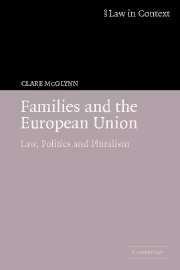Book contents
- Frontmatter
- Contents
- Preface
- Acknowledgments
- Table of cases
- Table of legislation and documents
- 1 Pluralism and human rights: a legal foundation for the regulation of families and family law in the European Union
- 2 Families, ideologies and value pluralism: towards an expanded concept of family
- 3 Children and European Union law: instrumentalism, protection and empowerment
- 4 Parenthood and European Union law: old ideologies and new ideals
- 5 European Union law and the regulation of intimate relationships: marriage, partnerships and human rights
- 6 The emergence of a European Union family law
- 7 Harmonisation, codification and the future of family law in the European Union
- Bibliography
- Index
5 - European Union law and the regulation of intimate relationships: marriage, partnerships and human rights
Published online by Cambridge University Press: 04 July 2009
- Frontmatter
- Contents
- Preface
- Acknowledgments
- Table of cases
- Table of legislation and documents
- 1 Pluralism and human rights: a legal foundation for the regulation of families and family law in the European Union
- 2 Families, ideologies and value pluralism: towards an expanded concept of family
- 3 Children and European Union law: instrumentalism, protection and empowerment
- 4 Parenthood and European Union law: old ideologies and new ideals
- 5 European Union law and the regulation of intimate relationships: marriage, partnerships and human rights
- 6 The emergence of a European Union family law
- 7 Harmonisation, codification and the future of family law in the European Union
- Bibliography
- Index
Summary
Rates of marriage are declining in the European Union. Rates of divorce in some member states are increasing rapidly. Rates of cohabitation are escalating. It seems, in fact, that the institution of marriage is unpopular, and increasingly so. Or, is it? Both the Netherlands and Belgium have introduced marriage for same-sex couples, and a significant number of member states now provide some form of legal recognition of same-sex relationships. Contradictions abound: the European Convention on Human Rights and the Union's Charter of Fundamental Rights both declare the ‘right to marry’ and prohibit discrimination on the grounds of sexual orientation. Yet, the Court of Justice and the Court of Human Rights refuse to define gay and lesbian partnerships as families and defend marriage as the preserve of heterosexual couples only.
In such a complex, controversial and empirically challenging context, what is the role of law and, in particular, the role of European Union law in the regulation of intimate relationships? The answer to such a question is not immediately apparent. It may be desirable that there is no regulation of intimate relations at the Union level, but this is not realistic in view of the competence of the Union. In the fields of equality, free movement, immigration, asylum and judicial co-operation, to name just a few areas, it is simply not possible for the Union to avoid encroaching on personal relationships.
- Type
- Chapter
- Information
- Families and the European UnionLaw, Politics and Pluralism, pp. 112 - 151Publisher: Cambridge University PressPrint publication year: 2006



